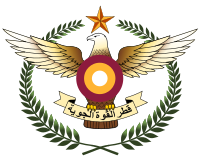Qatar Air Force
| Qatar Air Force | |
|---|---|

Qatar Air Force emblem
|
|
| Founded | 1974-present |
| Country | Qatar |
| Engagements |
Libyan Civil War 2015 military intervention in Yemen |
| Commanders | |
| Current commander |
Brigadier General Mubarak Mohammed Al Kumait Al Khayarin |
| Insignia | |
| Roundel |
 
|
| Ensign | |
| Aircraft flown | |
| Fighter | Mirage 2000 |
| Helicopter | Aérospatiale Gazelle, Westland Sea King, AgustaWestland AW139 |
| Trainer |
Alpha Jet Piper Cherokee Piper PA-34 Seneca |
| Transport | Boeing C-17 Globemaster III, Boeing 707, Boeing 727, Dassault Falcon 900 |
The Qatar Emiri Air Force is the air arm of the armed forces of the Persian Gulf state of Qatar.
In March 1968, in response to the British announcement that it would withdraw its armed forces from the Persian Gulf, Qatar set up armed forces, creating the Qatar Public Security Forces Air Wing, equipped with two Westland Whirlwind helicopters. In 1971, it acquired a combat capability when it purchased three ex-RAF Hawker Hunter jet fighters, which remained in use until 1981. It was renamed the Qatar Emiri Air Force in 1974.
The air force began a major expansion in 1979, when it ordered six Alpha Jet trainer/light attack aircraft. This was followed by orders for 14 Mirage F1 supersonic jet fighters in 1980, which were delivered between 1980-84. Twelve Gazelle helicopters, armed with HOT anti-tank missiles were received from 1983. Also in 1983, the air force took over the Qatar Police Air Wing.
In 1991, the Qatari Air Force contributed aircraft to conduct strikes against Iraqi forces during the Gulf War. After the conflict the government sought to fortify their air defense with the construction of a new base southwest of the Doha at Al Udaid. The facility has hardened aircraft shelters, air defence radars and Roland missile batteries. In the 1990s, they acquired more Alpha Jets with a ground attack capability and a squadron of Mirage F1s, from France.
In 2005, the Air Force participated in Exercise Eagle Resolve, along with Medical Services and Emergency Medical teams to build Interoperability with their US counterparts. The U.S. 26th Marine Expeditionary Unit took part in exercise to validate the nation’s crisis management plan prior to hosting the Asian Games in 2006.
...
Wikipedia
